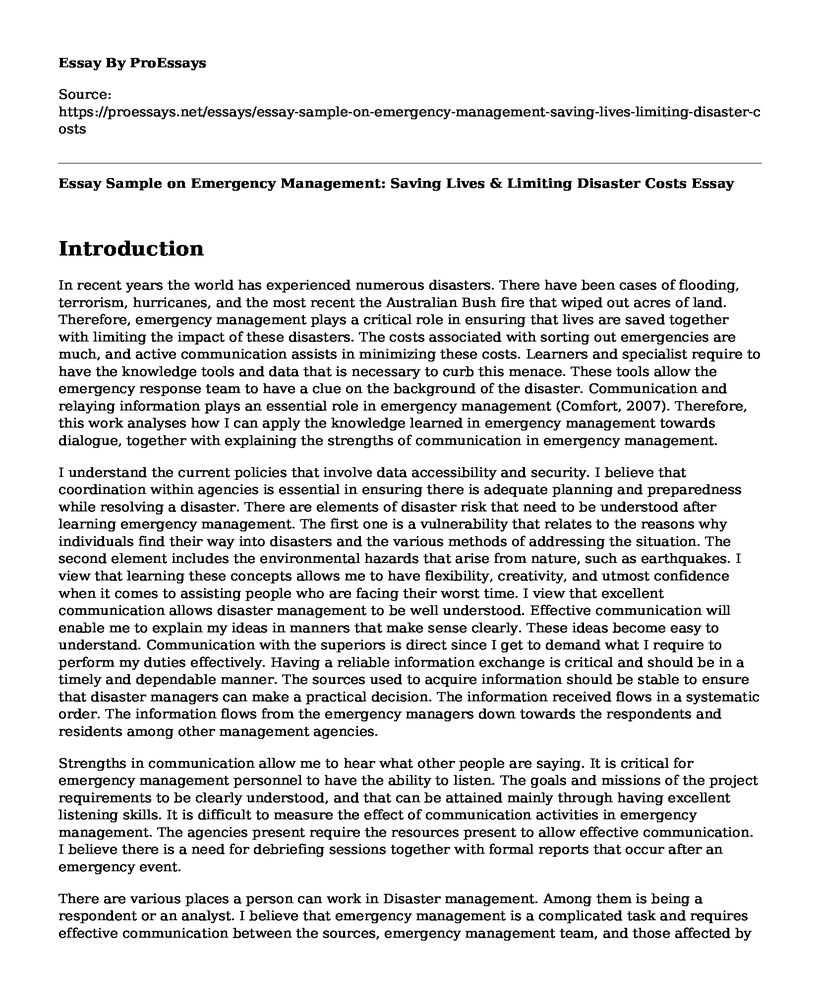Introduction
In recent years the world has experienced numerous disasters. There have been cases of flooding, terrorism, hurricanes, and the most recent the Australian Bush fire that wiped out acres of land. Therefore, emergency management plays a critical role in ensuring that lives are saved together with limiting the impact of these disasters. The costs associated with sorting out emergencies are much, and active communication assists in minimizing these costs. Learners and specialist require to have the knowledge tools and data that is necessary to curb this menace. These tools allow the emergency response team to have a clue on the background of the disaster. Communication and relaying information plays an essential role in emergency management (Comfort, 2007). Therefore, this work analyses how I can apply the knowledge learned in emergency management towards dialogue, together with explaining the strengths of communication in emergency management.
I understand the current policies that involve data accessibility and security. I believe that coordination within agencies is essential in ensuring there is adequate planning and preparedness while resolving a disaster. There are elements of disaster risk that need to be understood after learning emergency management. The first one is a vulnerability that relates to the reasons why individuals find their way into disasters and the various methods of addressing the situation. The second element includes the environmental hazards that arise from nature, such as earthquakes. I view that learning these concepts allows me to have flexibility, creativity, and utmost confidence when it comes to assisting people who are facing their worst time. I view that excellent communication allows disaster management to be well understood. Effective communication will enable me to explain my ideas in manners that make sense clearly. These ideas become easy to understand. Communication with the superiors is direct since I get to demand what I require to perform my duties effectively. Having a reliable information exchange is critical and should be in a timely and dependable manner. The sources used to acquire information should be stable to ensure that disaster managers can make a practical decision. The information received flows in a systematic order. The information flows from the emergency managers down towards the respondents and residents among other management agencies.
Strengths in communication allow me to hear what other people are saying. It is critical for emergency management personnel to have the ability to listen. The goals and missions of the project requirements to be clearly understood, and that can be attained mainly through having excellent listening skills. It is difficult to measure the effect of communication activities in emergency management. The agencies present require the resources present to allow effective communication. I believe there is a need for debriefing sessions together with formal reports that occur after an emergency event.
There are various places a person can work in Disaster management. Among them is being a respondent or an analyst. I believe that emergency management is a complicated task and requires effective communication between the sources, emergency management team, and those affected by the disaster. I know that a lack of experience can negatively impact the disaster management process. The situation leads to a stressful and uncomfortable condition, ineffective information delivery, and relaying causes complications during disaster management. As a respondent, I will ensure correct information is passed to the management officers for analysis.
Conclusion
In conclusion, the information is received from numerous sources such as emergency respondents, residents, and television or radio. The information is analyzed and evaluated to ensure the responses are timely. There are tools used to gather information range from websites, emails, together with other electronic modes of communication. A plan needs to be attained to facilitate and effective emergency response to disasters. Communication and exchange of information are factors that allow effective service delivery.
Reference
Comfort, L. K. (2007). Crisis management in hindsight: Cognition, communication,coordination, and control. Public Administration Review, 67, 189-197.
Cite this page
Essay Sample on Emergency Management: Saving Lives & Limiting Disaster Costs. (2023, Mar 26). Retrieved from https://proessays.net/essays/essay-sample-on-emergency-management-saving-lives-limiting-disaster-costs
If you are the original author of this essay and no longer wish to have it published on the ProEssays website, please click below to request its removal:
- How IT Competencies are Essential to Nursing Research
- Case Study Example: Diabetic Type 1 in a Student
- The Effects of Leber's Hereditary Optic Neuropathy
- Essay Sample on Vaccine Doses
- Teratogens: Causes of Congenital Deformities in Fetuses - Essay Sample
- Connor's Parents Dismissed for Failing to Exhaust Claims Under IDEA - Essay Sample
- Access to Water: Essential for Life & Public Health - Essay Sample







